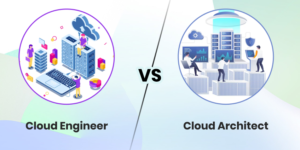
In today’s rapidly growing tech landscape, Thriving Career in Cloud Computing has become the beating heart of digital transformation. As organizations across industries migrate their operations to the cloud, the need for qualified experts in this area has soared. To thrive in a cloud computing career, one must prepare themselves with various skill sets beyond the basics.
This blog will delve into the 15 must-have technical skills that will not only open doors but also help you excel in the dynamic world of cloud computing. From mastering cloud platforms to ensuring robust security, you’ll be well on your way to success in this ever-expanding domain.
What is Cloud Computing?
Cloud computing is a transformative technology that revolutionizes storing, accessing, and managing data and applications. It entails delivering storage, processing, and software over the Internet. Rather than depending on local servers or personal computers, cloud computing makes use of remote data centers maintained by service providers.
This approach offers numerous advantages, such as scalability, cost-efficiency, and accessibility wherever there is a network connection. Cloud computing has become the spine of modern companies, enabling them to innovate, scale rapidly, and adapt to changing needs without the burden of managing complex on-premises infrastructure.
What are the three main types of cloud services?
Three main types of cloud services are:
- Infrastructure as a Service (IaaS):
○ Provides virtualized computing resources over the internet.
○ Users can rent virtual machines, storage, and networking pay-as-you-go.
○ It offers scalability and flexibility, making it suitable for developers and IT professionals.
- Platform as a Service (PaaS):
○ Offers a platform and environment for developers to develop, deploy, and manage applications.
○ Users can focus on coding and application logic without worrying about the underlying infrastructure.
○ Facilitates rapid development and simplifies the deployment procedure.
- Software as a Service (SaaS):
○ Delivers software applications and services over the Internet
○ Web browsers can be used to access the software without installation.
○ Provides convenience and accessibility for end-users, with examples including email services and office productivity suites like Microsoft 365.
Here are the cloud computing skills in demand
1. Cloud Service Providers Proficiency
Proficiency in significant cloud service providers such as AWS, Azure, and Google Cloud is paramount in cloud computing skills. These industry giants offer many cloud solutions, and it is vital to understand their nuances. AWS, with its extensive service offerings, caters to diverse needs.
Deeply integrated with Microsoft products, Azure is a go-to for hybrid cloud solutions. Google Cloud, known for its data analytics capabilities, has unique strengths. To excel in cloud computing, mastering these platforms is like having a versatile toolkit, enabling you to architect, deploy, and manage cloud solutions with precision and expertise.
2. Cloud Security Expertise
In cloud computing skills, cloud security expertise stands as an imperative pillar. Security is critical in cloud computing, as sensitive data and applications are entrusted to remote servers. Professionals in this field must excel in identity and access management, ensuring only authorized users can access resources.

Encryption techniques are vital for safeguarding data in transit and, at rest, thwarting potential breaches. Compliance knowledge is essential to meet industry regulations and standards, preventing legal and reputational pitfalls. A firm grasp of these facets empowers cloud experts to fortify digital fortresses, ensuring data integrity and confidentiality in this ever-evolving landscape.
3. Networking Fundamentals
In cloud computing skills, networking fundamentals hold a pivotal role. Networking knowledge is the backbone of cloud setups, facilitating seamless communication between virtual resources and end-users. Virtual Private Clouds (VPCs) establish isolated environments, enhancing security and resource management. Virtual Private Networks (VPNs) ensure encrypted and secure connections to cloud resources, even across public networks.
Content Delivery Networks (CDNs) optimize data delivery by caching content at strategic edge locations, reducing latency. A firm grasp of these networking concepts empowers cloud professionals to design, deploy, and maintain robust cloud infrastructures, ensuring that data flows smoothly and securely, ultimately enhancing the overall cloud computing experience.
4. Containerization and Orchestration
Containerization and orchestration are pivotal cloud computing skills in demand, revolutionizing deployment processes. Docker, a containerization platform, encapsulates applications and their dependencies, ensuring consistency across diverse environments. Kubernetes, an orchestration tool, automates container management, scaling, and load balancing.
These technologies offer agility and scalability, allowing applications to be replicated and distributed. They enhance resource utilization, reduce infrastructure costs, and efficiently scale to meet varying workloads. With Docker and Kubernetes expertise, cloud professionals can streamline development, minimize deployment challenges, and ensure consistent performance, making them indispensable for modern cloud computing environments.
5. Serverless Computing
Serverless computing is a game-changer in cloud computing skills in demand. This model abstracts server management, letting developers concentrate only on code. It offers cost-effectiveness by charging only for actual resources, eliminating idle server costs. AWS Lambda, Azure Functions, and Google Cloud Functions are key players, each offering a serverless framework.

Image Source: Newpath Web
Proficiency in these platforms empowers cloud professionals to design, deploy, and manage microservices and event-driven applications seamlessly. It enables rapid development, auto-scaling to meet demand, and reduces operational overhead. Mastering serverless computing is a significant asset, enhancing productivity and resource optimization in cloud environments.
6. Infrastructure as Code (IaC)
Infrastructure as Code (IaC) is a vital skill required for cloud computing. It involves using tools like Terraform and AWS CloudFormation to define and manage infrastructure through code. Automating infrastructure provisioning brings numerous benefits, such as consistency and repeatability in deployment.
IaC reduces the risk of human errors, enhances collaboration among teams, and accelerates the deployment process. It allows for version control, making it more effortless to track changes and roll back if required. Ultimately, mastering IaC streamlines infrastructure management optimizes resource utilization, and ensures a more agile and efficient cloud environment, making it an essential skill for cloud professionals.
7. DevOps Practices
Integrating DevOps practices with cloud engineering skills is pivotal in modern tech landscapes. DevOps bridges the gap between development and operations, enhancing collaboration and automation. Proficient cloud professionals are adept in implementing Continuous Integration/Continuous Deployment (CI/CD) pipelines, which automate software delivery, ensuring rapid and reliable releases.
Version control systems like Git facilitate seamless code management and collaboration. Automated testing tools help maintain software quality and reliability. The synergy between DevOps and cloud computing streamlines development workflows and accelerates time-to-market. It ensures robust, error-free cloud applications, making these skills indispensable in the arsenal of cloud computing experts.
8. Monitoring and Logging
Monitoring and logging are essential to cloud engineering skills for ensuring cloud computing in healthcare and it’s performance of cloud applications. Effective monitoring provides real-time insights into resource utilization, application behavior, and security threats. Tools like AWS CloudWatch, Azure Monitor, and Prometheus offer comprehensive visibility, alerting, and log management capabilities.
They enable proactive issue detection, rapid troubleshooting, and resource optimization. Cloud professionals with these tools can ensure uninterrupted service delivery, cost efficiency, and service level agreements (SLAs) compliance. In the dynamic world of cloud computing, mastering monitoring and logging is indispensable for maintaining robust and reliable cloud environments.
9. Database Management Skills
Database management skills are critical in cloud technologies skills, where data is a cornerstone. Cloud platforms offer managed database services for SQL (Structured Query Language) and NoSQL databases, simplifying administration and scaling. SQL databases like Amazon RDS and Azure SQL Database are ideal for structured data, providing reliability and consistency.

NoSQL databases such as AWS DynamoDB and Azure Cosmos DB excel in handling unstructured or semi-structured data, delivering flexibility and scalability. Proficiency in managing these databases in the cloud is essential for cloud professionals, ensuring data availability, security, and performance in the ever-evolving digital era.
10. Big Data and Analytics
Cloud platforms are pivotal in big data and analytics, revolutionizing data processing. They offer scalable and cost-effective solutions for handling vast datasets. AWS EMR, Azure HDInsight, and Google BigQuery are critical tools. AWS EMR simplifies the deployment of big data frameworks like Apache, Hadoop, and Spark.
Azure HDInsight offers a managed big data service, supporting Hadoop, Spark, and more. Google BigQuery excels in fast and scalable analytics on large datasets. Proficiency in these tools enables cloud professionals to harness the power of big data, extract valuable insights, and drive data-driven decision-making, making it a crucial skill set in cloud computing.
11. Multi-Cloud and Hybrid Cloud Knowledge
Multi-cloud and hybrid cloud strategies offer flexibility and resilience and are invaluable in cloud computing skills. Multi-cloud leverages multiple cloud providers to avoid vendor lock-in, optimize costs, and enhance redundancy. A hybrid cloud combines private and public cloud resources, which is ideal for workloads with varying security and compliance needs.
Proficiency in these strategies demands workload orchestration, data integration, and network management skills. Cloud professionals adept in multi-cloud and hybrid cloud architectures ensure that applications seamlessly span different environments, offering businesses adaptability, scalability, and risk mitigation in an ever-evolving technological landscape. These skills are fundamental for modern cloud experts.
12. Automation and Scripting
Automation and scripting are linchpins in cloud computing skills, enabling efficient and repeatable processes. Scripting languages like Python, PowerShell, and Bash empower cloud professionals to automate routine tasks, from provisioning resources to managing configurations. Python’s versatility makes it a go-to choice for various cloud automation scenarios.
PowerShell excels in managing Windows-based cloud environments, while Bash is indispensable for Linux-based systems. Proficiency in these languages streamlines cloud operations, reduces human error, and accelerates response times, enhancing productivity and resource utilization. Scripting skills are an essential toolkit for cloud experts, driving the agility and scalability of cloud solutions.
13. Cloud Cost Management
Cloud cost management is crucial to cloud computing skills, ensuring efficient resource utilization. To optimize costs, professionals must employ strategies like rightsizing, where resources match actual needs, and utilizing reserved instances or spot instances for cost-effective computing. Budgeting skills help create financial guardrails, preventing unexpected expenses.
Resource tagging allows for tracking and attributing costs accurately. Proficiency in these areas helps cloud experts balance performance and budget constraints, ensuring that cloud resources are used judiciously, reducing waste, and ultimately improving the bottom line for organizations operating in the cloud. Cost management skills are indispensable in today’s cloud-centric world.
14. Disaster Recovery and Business Continuity
Disaster recovery planning is critical to cloud computing skills, safeguarding businesses against unforeseen disruptions. It ensures data and applications can be swiftly restored, minimizing downtime and data loss. Skills in backup strategies, including regular, incremental, and differential backups, are essential for data resilience.

Image Source: Successive Cloud
Replication techniques, like synchronous and asynchronous replication, help maintain data consistency across locations. Failover expertise ensures seamless transitions to backup systems during an outage. Proficiency in disaster recovery and business continuity ensures organizations can weather unexpected storms, protecting data integrity and maintaining operational continuity in an increasingly digital-dependent world.
15. Soft Skills and Communication
Soft skills and effective communication are often overlooked but incredibly important in cloud computing skills. Strong communication skills are essential in a field that demands collaboration across teams and with clients. Cloud professionals must convey complex technical concepts clearly and understandably, fostering effective teamwork.
Problem-solving skills enable them to tackle issues creatively and efficiently. Client interaction skills are crucial for understanding client needs and delivering solutions that align with their objectives. Mastering these soft skills enhances professional relationships and ensures that cloud projects run smoothly, ultimately leading to successful outcomes in the dynamic world of cloud computing.
Conclusion
In the fast-paced world of cloud computing skills, mastering the 15 must-have technical skills discussed in this guide is the key to surviving and thriving in this dynamic field. From cloud service provider proficiency to security expertise, containerization, and beyond, these skills empower professionals to architect, manage, and secure the digital landscapes of today and tomorrow.
As the demand for cloud solutions continues to soar, those equipped with these skills are at the forefront of innovation, enabling businesses to scale, optimize costs, and achieve unparalleled agility. Embracing these skills is not just a career choice; it’s a journey toward becoming a linchpin in the digital transformation landscape.






